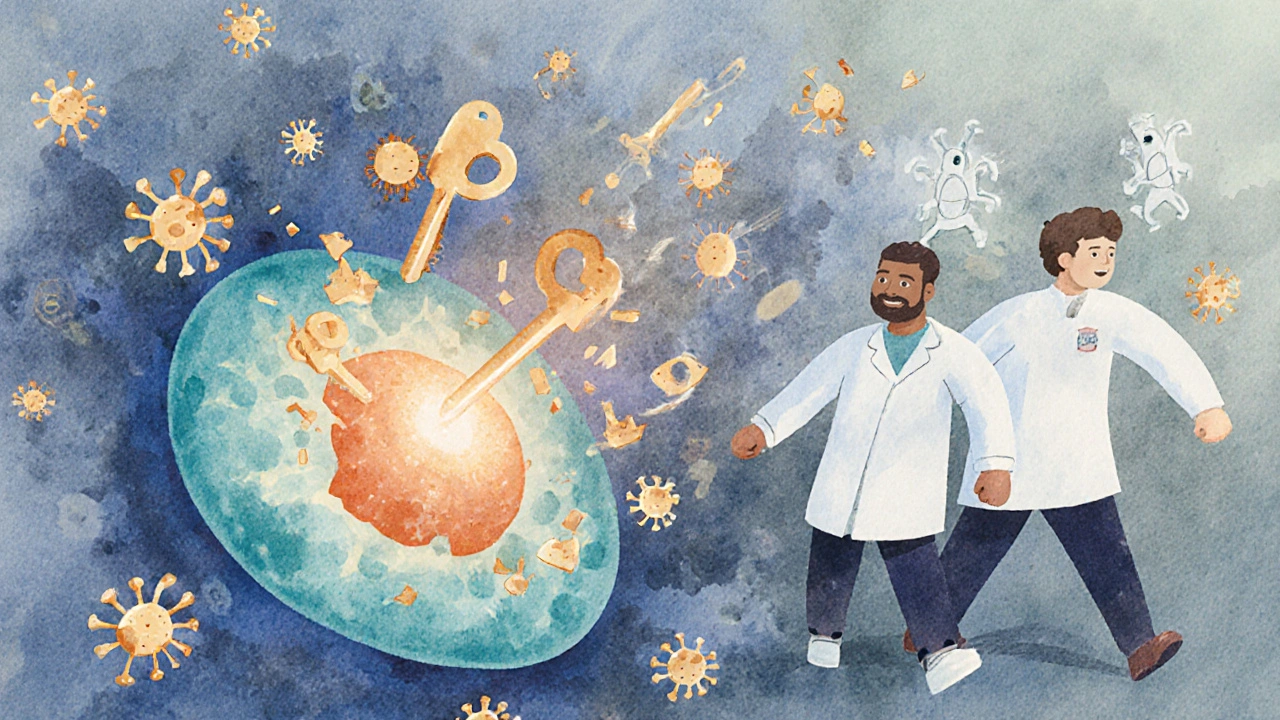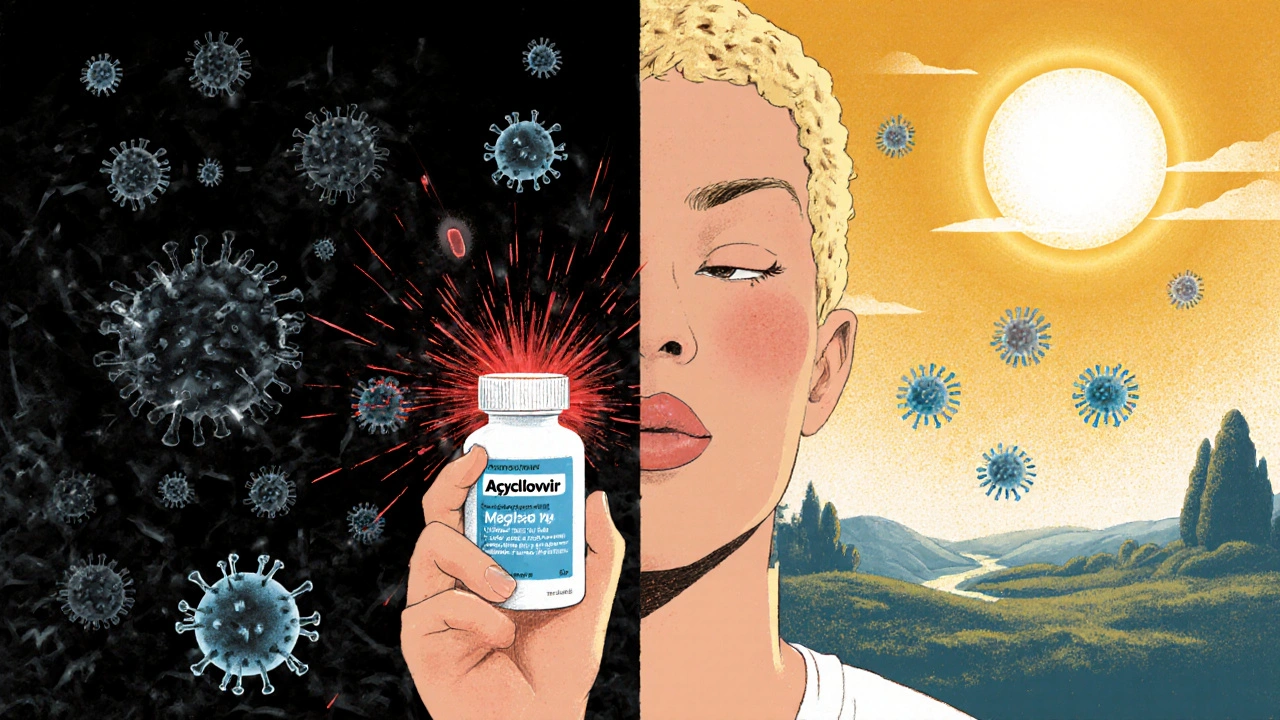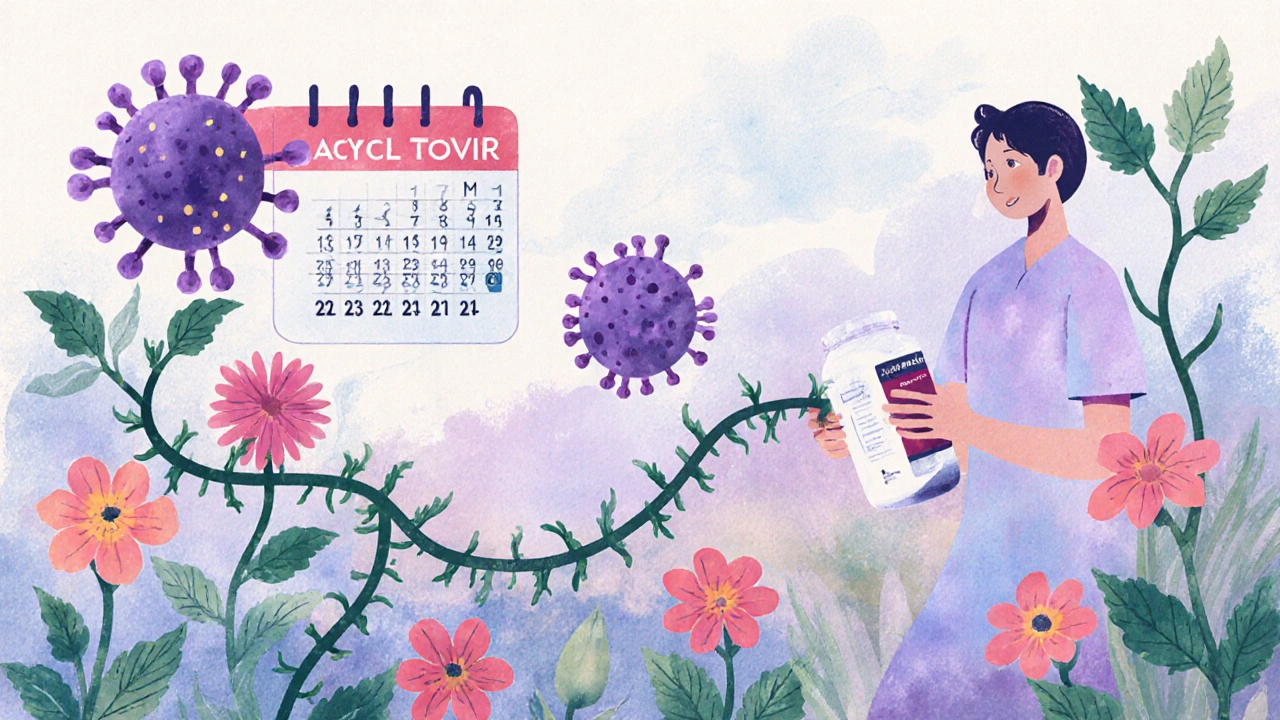Acyclovir and the Immune System: How It Helps Fight Viruses

When you get a cold sore or a shingles outbreak, it’s not just the blister that hurts-it’s the feeling that your body is losing the fight. That’s where acyclovir comes in. It doesn’t kill viruses outright. Instead, it gives your immune system the edge it needs to win. If you’ve ever wondered how a small pill or cream can stop a virus from spreading, the answer lies in how acyclovir works with your body’s natural defenses-not against them.
What Acyclovir Actually Does
Acyclovir is an antiviral drug. It’s not an antibiotic. That’s important. Antibiotics fight bacteria. Acyclovir only works on certain viruses-mainly herpes simplex virus (HSV-1 and HSV-2), varicella-zoster virus (which causes chickenpox and shingles), and sometimes Epstein-Barr virus. It doesn’t cure these infections. It doesn’t make the virus disappear from your body forever. What it does is slow it down.
Here’s how: Viruses copy themselves by hijacking your cells. They use your cell’s machinery to build new virus particles. Acyclovir tricks the virus into using it instead of the real building blocks it needs. Once the virus tries to copy its DNA using acyclovir, the process breaks down. The new virus particles are incomplete. They can’t infect other cells. That means the infection doesn’t spread as fast.
This is where your immune system steps in. With fewer viruses replicating, your white blood cells, antibodies, and natural killer cells have a much easier job. They can find and destroy the weakened viruses before they take over. Acyclovir doesn’t boost your immune system like a supplement. It just removes the overload so your body can do what it already knows how to do-fight back.
Why Timing Matters
Acyclovir works best when you start it early. If you feel that tingling or burning before a cold sore appears, that’s your body’s early warning. Taking acyclovir at this stage can stop the sore from forming at all. Studies show that starting treatment within 48 hours of the first symptoms cuts healing time by about 30% and reduces pain significantly.
Wait too long, and the virus has already spread to many cells. At that point, acyclovir still helps, but it’s like trying to put out a fire after the whole house is burning. The immune system is overwhelmed. The drug can still limit damage, but it won’t reverse what’s already happened.
This is why doctors stress: don’t wait for the blister to show up. If you know you’re prone to outbreaks-whether from stress, sun exposure, or illness-keep acyclovir on hand. Keep it in your medicine cabinet, your purse, even your car. When you feel that first sign, take it. It’s not magic. But it’s one of the few tools that actually changes the course of the infection.
How It Affects Your Immune Response
Your immune system doesn’t just sit around waiting for invaders. It remembers them. After your first herpes outbreak, your body keeps T-cells and antibodies ready. But if the virus reactivates too often, your immune system gets tired. That’s called immune exhaustion.
Acyclovir helps prevent that. By reducing the number of active virus copies each time, it gives your immune system time to recover between outbreaks. People who take acyclovir daily for suppression don’t just get fewer cold sores-they also have less inflammation in their skin and nerves. That means less long-term damage, less nerve pain, and fewer flare-ups triggered by stress or fatigue.
One 2023 study followed 427 people with frequent herpes outbreaks over two years. Those taking daily acyclovir had 78% fewer outbreaks than those on placebo. But more importantly, their immune markers showed lower levels of inflammatory proteins like IL-6 and TNF-alpha. In other words, acyclovir didn’t just reduce symptoms-it helped restore balance to the immune system.

Who Benefits Most?
Not everyone needs acyclovir. If you get a cold sore once every few years and it clears up on its own, you probably don’t need it. But if you’re dealing with:
- Outbreaks more than twice a year
- Painful or large sores that take over two weeks to heal
- Herpes in sensitive areas like eyes or genitals
- Shingles, especially if you’re over 50 or have a weakened immune system
Then acyclovir isn’t just helpful-it’s important. For people with HIV, organ transplants, or cancer treatments, herpes can become life-threatening. Acyclovir is often part of routine care for these groups because it prevents serious complications.
Even healthy people can benefit. A 2024 clinical review found that acyclovir reduced the risk of herpes transmission to partners by 48% when taken daily. That’s not just about personal comfort-it’s about protecting others too.
Side Effects and Misconceptions
Some people avoid acyclovir because they think it’s toxic. It’s not. The most common side effects are mild: nausea, headache, or dizziness. These usually go away after a few days. Serious reactions are rare. Kidney problems can happen, but only if you’re dehydrated or already have kidney disease. Drinking water while taking it reduces that risk.
Another myth: acyclovir makes you immune to herpes. It doesn’t. The virus stays in your nerves forever. But with regular use, it stays quiet. You’re not cured-but you’re in control.
And no, it doesn’t work on the common cold or flu. That’s a big mistake people make. Acyclovir targets only herpes-family viruses. Taking it for a sore throat or runny nose won’t help-and it won’t hurt, but it’s pointless.

How to Use It Right
Acyclovir comes in pills, creams, and IV form. For most people, oral tablets are enough. Creams work for cold sores on the lips but don’t penetrate deep enough for genital herpes or shingles. Pills reach the nerves where the virus hides.
For outbreaks: Take 200 mg five times a day for 5-10 days. For suppression: 400 mg twice daily. For shingles: 800 mg five times a day for 7-10 days. Always finish the full course-even if the sores are gone. Stopping early lets the virus bounce back.
Don’t skip doses. Consistency matters. The drug works best when levels in your blood stay steady. Set phone alarms if you need to.
What Else Helps Alongside Acyclovir
Medication isn’t the whole story. Your immune system needs support:
- Get enough sleep-your body repairs itself while you rest
- Manage stress-cortisol weakens immune response
- Eat zinc-rich foods-nuts, seeds, beans help with healing
- Avoid sugar and alcohol-they feed inflammation
- Use cool compresses on sores-they reduce pain and swelling
Some people take lysine supplements. The evidence is mixed. A 2022 meta-analysis found no strong benefit over placebo. Stick to proven methods: medication, rest, hydration.
When to See a Doctor
See a doctor if:
- Sores don’t improve after 10 days
- You have fever, confusion, or vision changes
- You’re pregnant or breastfeeding
- Your immune system is compromised
- Outbreaks are getting worse or more frequent
These could mean the virus is resistant, or something else is going on. Don’t assume acyclovir isn’t working. Sometimes, you need a different dose-or a different drug.
Acyclovir has been used since the 1980s. It’s one of the most studied antivirals in history. Millions of people have taken it. It’s safe, effective, and affordable. It doesn’t fix everything-but it gives your immune system the space it needs to do its job. That’s more than most treatments can say.
Does acyclovir cure herpes?
No, acyclovir does not cure herpes. The virus stays in your nerve cells for life. But acyclovir stops it from multiplying, which reduces outbreaks, speeds healing, and lowers the chance of spreading it to others.
Can I take acyclovir with other medications?
Yes, but check with your doctor. Acyclovir can interact with drugs like probenecid, which affects kidney clearance, and other nephrotoxic medications. Never mix it with NSAIDs like ibuprofen without medical advice, especially if you have kidney issues.
Is acyclovir safe during pregnancy?
Yes. Multiple studies show acyclovir is safe in pregnancy. It’s often prescribed to prevent outbreaks near delivery to reduce the risk of passing herpes to the baby. Topical use is also considered low risk.
How long does it take for acyclovir to work?
You may notice less pain and faster healing within 2-3 days. But the full effect takes 5-10 days. Even if sores look gone, finish the course. Stopping early can lead to rebound outbreaks.
Can I use acyclovir cream and pills together?
Yes, especially for severe or widespread outbreaks. Creams help with surface sores, while pills target the virus inside nerves. Using both gives you the best chance of controlling the infection quickly.
Does acyclovir help with shingles pain?
It helps reduce the severity and duration of the rash, which lowers the risk of long-term nerve pain (postherpetic neuralgia). Starting within 72 hours of the rash appearing gives the best results. Pain relief often comes as the rash heals, but some people need extra pain meds.
If you’ve had a herpes outbreak and thought you were stuck with it, think again. Acyclovir doesn’t promise perfection-but it gives you power. Power to heal faster. Power to prevent spread. Power to live without fear of the next flare-up. That’s not just medicine. That’s freedom.
I’ve been on acyclovir for years because of frequent cold sores, and honestly? It’s the only thing that keeps me from hiding my face in photos. I used to get them every time I was stressed or sick-now, if I catch the tingling early, I’m back to normal in three days. No more avoiding hugs or kissing my niece. It’s not magic, but it’s the closest thing I’ve found to reclaiming my life.
Also, side note: drinking water while taking it? Non-negotiable. I learned that the hard way after a kidney scare. Don’t be me.
This is one of those rare medical topics where the science actually matches real life. I used to think antivirals were just placebo pills until I got shingles at 32. Took acyclovir within 36 hours of the first sting-and the rash didn’t even spread past my ribcage. My doctor said I dodged a bullet. Turns out, your immune system doesn’t need a boost-it just needs a break. And acyclovir gives it that. No supplements. No crystals. Just science that works.
Also, if you’re gonna use the cream, don’t just dab it. Rub it in like you’re calming a crying baby. It helps.
Let me tell you something that nobody talks about: acyclovir doesn’t just treat outbreaks-it reshapes your relationship with your own body. I used to live in fear of the next tingling, the next blister, the next week of embarrassment. But after two years of daily suppression therapy, I noticed something deeper: my anxiety around intimacy dropped. My skin stopped feeling like a betrayal. My sleep improved. My immune system stopped feeling like it was in a constant war zone.
It’s not just a pill. It’s a quiet revolution. You start seeing your body not as a broken machine, but as something that can heal-if you give it the right tools. And acyclovir? It’s not the hero. It’s the sidekick that lets the real hero-the immune system-shine. That’s why I’ll never stop recommending it. Even to strangers at the grocery store. I’m that guy now.
And yes, I’ve had people ask me if I’m ‘addicted’ to it. I told them, ‘No, I’m addicted to not feeling like garbage every other month.’
Let’s be clear: acyclovir does not ‘help your immune system.’ That’s misleading pseudoscience. It inhibits viral DNA polymerase-a specific enzymatic pathway. There is no ‘edge’ given. There is no ‘balance restored.’ The immune system is not a passive bystander-it’s an active, dynamic network. To say acyclovir ‘gives it space’ is anthropomorphizing biology to the point of absurdity.
Furthermore, the claim that it ‘reduces inflammation markers’ is statistically significant but clinically marginal. IL-6 and TNF-alpha fluctuations are transient. The study you cite had no control for confounding variables like diet, sleep, or stress levels. This is not medicine. It’s marketing dressed in peer-reviewed clothing.
And while we’re at it: lysine supplements aren’t ‘unproven’-they’re under-researched. You’re dismissing them because they’re cheap and unpatentable. That’s not science. That’s pharmaceutical bias.
So… you’re telling me I should take a pill every time I feel a little tingle… and I’m supposed to be grateful? Like, wow. What a miracle. Next you’ll tell me I should thank my toothbrush for not letting my gums bleed.
Regarding dosage: the recommended regimen for suppression is 400 mg twice daily, as stated; however, pharmacokinetic studies indicate that peak plasma concentrations are achieved within 1.5–2.0 hours post-administration, with a half-life of approximately 2.5–3.3 hours in individuals with normal renal function. Therefore, dosing intervals must be strictly maintained to prevent subtherapeutic trough levels, which may facilitate viral replication despite apparent compliance.
Additionally, the 78% reduction in outbreaks cited in the 2023 study was observed under ideal adherence conditions; real-world adherence rates for chronic antiviral regimens average 55–65%, which significantly attenuates efficacy. This is rarely discussed in patient-facing materials.
Moreover, while acyclovir is considered safe in pregnancy, its placental transfer rate is approximately 40%, and long-term neurodevelopmental outcomes in children exposed in utero remain incompletely characterized beyond five years of age. More longitudinal data is needed.
Let’s cut through the fluff. Acyclovir doesn’t ‘restore balance.’ It just slows the virus down-like putting a speed limiter on a car that’s about to crash. The immune system doesn’t get ‘stronger’-it just gets less overwhelmed. And yes, it reduces outbreaks, but so does avoiding stress, sugar, and people who make you miserable.
Here’s the truth: this drug is a Band-Aid on a bullet wound. The virus stays. The nerve damage stays. The emotional trauma stays. You’re just buying yourself a few more weeks of comfort before the next flare-up.
And let’s not pretend this is some noble medical breakthrough. It’s a $5 generic pill that Big Pharma turned into a lifestyle product. People are scared of their own bodies. They want a pill to fix it. This isn’t healing. It’s chemical avoidance.
I get where the cynics are coming from, but I’ve seen this work in real life-my mom had shingles at 68, and she was in agony. She started acyclovir on day two, and within a week, she was walking again. Not cured, but functional. Not perfect, but peaceful.
Maybe it’s not magic. Maybe it’s not a cure. But sometimes, medicine doesn’t need to be heroic to be meaningful. Sometimes, it just needs to give someone back a few hours of sleep, a few days without pain, a few moments where they don’t feel like their body is the enemy.
I’m not here to sell it. I’m here to say: if it helps you live better, even a little, then it’s worth it. Don’t let the noise drown out the quiet wins.
Here’s the real question nobody asks: if acyclovir works so well, why does herpes still exist? Why hasn’t evolution wiped it out? Maybe the virus isn’t the problem. Maybe it’s the symptom.
What if herpes isn’t something your body ‘gets’-but something it’s trying to tell you? Stress. Suppressed emotion. Burnout. The immune system doesn’t just fight viruses-it responds to chaos. Maybe the blister isn’t the enemy. Maybe it’s the messenger.
Acyclovir silences the messenger. But what if we listened instead?
I’m not saying ditch the pill. I’m saying: take the pill, then ask yourself: why am I so tired? Why am I so stressed? Why does my body keep screaming?
Wow. So we’re just supposed to trust this? No long-term studies? No data on gut microbiome disruption? No mention of how chronic antiviral use might alter viral evolution? You’re acting like this is a vitamin.
And you think people are ‘in control’? You’re delusional. You’re medicating symptoms while ignoring root causes. You’re not empowered-you’re dependent.
And for the love of science, stop calling this ‘freedom.’ Freedom is not taking a pill every day to keep a dormant virus quiet. Freedom is not being afraid of your own skin.
Acyclovir isn’t a solution. It’s a corporate-approved coping mechanism.